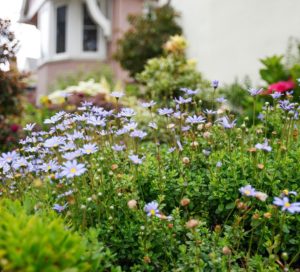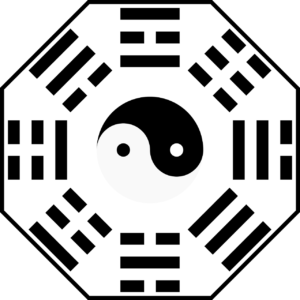Practicing feng shui, an ancient art formalized thousands of years ago, is a necessity in your home – but what many people forget is that it can be tremendously beneficial to practice it outdoors, too.
The term feng shui, literally translated from Chinese to wind and water, respectively, is the art of placement and understanding how the placement of objects in your space can affect your life. It’s complex, but the central theme is balance and harmony, and its primary goal is to assure good fortune for the people who inhabit and use the space. The main principle of feng shui is yin and yang; you need a good balance between feminine (yin) and masculine (yang) to promote a good flow of chi, which is essential to a happy and successful life. The two are dependent upon each other, although they’re opposites, and discord is inevitable when one side outweighs the other.
In feng shui, there are five elements, each represented by their own colors that make up everything:
• Wood
• Fire
• Earth
• Metal
• Water
What is Bagua?
A bagua (pronounced “bag-wha”) is a feng shui energy map. It’s an octagonal grid that contains all the symbols of the ancient oracle on which feng shui is based, called the I Ching. The bagua of your home can help you understand the relationships and connections between different areas and how they parallel your life experience. You can use a bagua to identify each space and then position specific items within the spaces to enhance their feng shui.

Using Feng Shui for Your Outdoor Living Space
Whether you spend a great deal of time outdoors or it’s just on your way to your private space inside, it’s important that you put the principles of feng shui into practice outside your home to help assure your success and well-being. If the outside of your home is negative, it will outweigh the good you do for your indoor feng shui.
You can apply feng shui principles in four easy steps:
• Exterior paint
• Front porches and doors
• Gardens
• Landscaping elements
1. Choose Your Exterior Paint
Ideally, your home will be in balance and harmony with its outdoor surroundings. While you may not be able to perfectly match your home with its environment, which is sometimes the case with restrictive homeowner associations or financial restraints, you can make small improvements that help restore balance and promote harmony.
Examine the colors of the natural landscape and those of neighboring houses. The idea isn’t to make your home disappear, but to make it work harmoniously through a subtle balance. Vibrant colors used as highlights, such as in window trim or other architectural details, can attract vibrant, positive energy. You’ll also need to be mindful of your birth element, and the birth elements of everyone living in the home.

2. Design Your Front Porch and Door
Often, the key to good feng shui lies in the front door. Your home gets its energy nourishment through its front door, so you want it to be strong and balanced. It has to promote the open flow of energy, and the color must be in harmony with the direction in which it opens. Use this chart to help you decide on the best possible front door color for feng shui.
Directional Colors for Good Energy
|
Facing Direction |
Compatible Colors |
Incompatible Colors |
|
East |
Green Black Blue |
Red/Orange White Gray |
|
South |
Red/Orange Purple Green |
Brown/Sandy Tones Black Blue |
|
West |
White Gray Brown/Sandy Tones |
Black Blue Red/Orange |
|
North |
Black Blue White/Gray |
Green Brown Sandy Tones |
This color chart is based on the Five Element Color Theory and provided by Maureen Calamia at Luminous Spaces.
You also need to ensure that your front door is always in good shape or you’ll risk attracting negative energy. Make sure its paint isn’t chipped or cracked, and keep it clean with the hinges oiled.

3. Create Balance in Your Garden
If your garden employs the right feng shui principles, you’ll attract even more positive vibes your way – and it’ll be a beautiful place where you’ll enjoy spending time. It’s not whether you have a large space that counts, either; it’s simply in its layout, health and design. You’ll need to rely on your bagua and understand the five elements to create a proper feng shui garden, but here’s a quick guide to get you started:
• The northeast area of a garden is connected to personal growth, so you need earth. It’s the perfect spot for a Zen garden with rock formations.
• Water features belong in the southeast, east or north side.
• Plan for curving pathways so Chi can flow properly.
• Use wind chimes to create healing vibrations in the air.
• Plan color according to the five elements, just like you would with your front door.

4. Add Landscaping Elements
Your landscaping, similar to your garden, doesn’t depend on the quantity of space; rather, it depends on the quality of what you have. Your whole outdoor living space can depend on proper feng shui, so here’s what you need to know:
• North: Associated with your career path, so you can use water features (including bird baths) in this part of your yard. Deep blues and blacks are the perfect colors for this area.
• Northeast: Where your spiritual growth and knowledge are centered, so this is where the most beautiful views belong (like your garden), as well as most of your seating.
• East: Represents health and longevity, so make this space green and healthy. Ornamental trees are perfect in your east-side landscaping.
• Southeast: is for money and abundance, and the right colors are purple and gold. Wooden ornaments are most beneficial here, as are accenting water features.
• South: Associated with fire, which is where your grill or fire pit belongs. Place it near your patio or pergola to create a place for outdoor entertaining.
• Southwest: The place for love and relationships, so put a comfortable bench or swing there, and keep in mind that the right colors are pink, red and yellow.
• West: Promotes creativity, so it’s the perfect place to set aside space for children.
• Northwest: Associated with new people and travel, so this should be an open place (the element is metal, and the colors are gray and white) where you can greet people and get to know each other.

***All pictures used in this article are either from redfin.com or unsplash.com and have no attribution required.***

